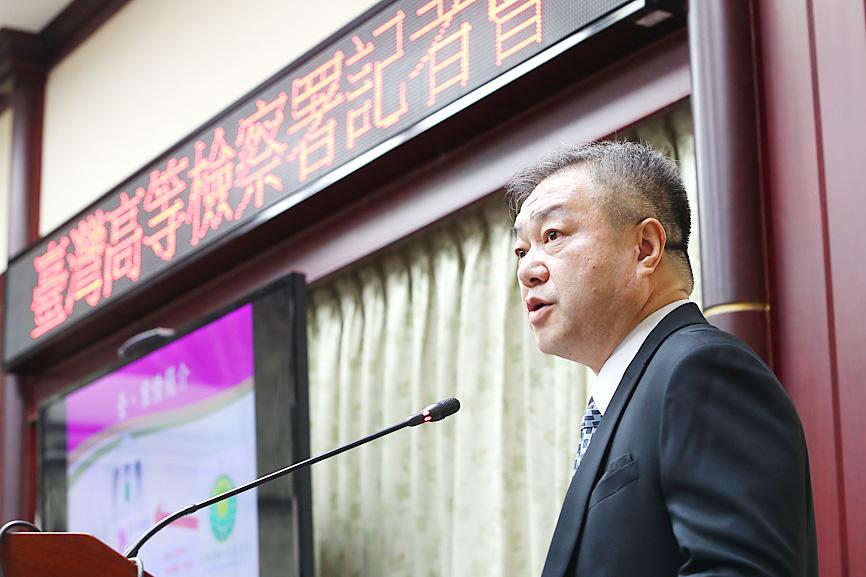The High Court was on Monday instructed to retry a 1997 lawsuit brought by business tycoon Weng Mao-chung (翁茂鍾) due to its bearing on the death of bank manager Chu Ching-en (諸慶恩) and the subsequent uncovering of the justice system’s biggest corruption scandal.
The Taiwan High Prosecutors’ Office said that new evidence had come to light, and that a review of the case uncovered possible flaws in the trial procedure and examples of undue influence, leading prosecutors to question whether Weng and Chu had received a fair trial.
Chu represented Paribas Bank in the lawsuit brought by Weng, president of Chia Her Industrial Co, over a US$10 million check issued by I-Hwa Industrial Co — a textile company owned by Weng’s Tainan-based Chia Her conglomerate — which was used as collateral.

Photo: CNA
“After reviewing the case documents and trial transcripts, I became quite despondent,” Taiwan High Prosecutors’ Office spokesman Wu Yi-ming (吳怡明) told a news conference. “We now believe that Chu was wronged by the court’s decision, and that the case should be retried.”
“It is always the right time to do the right thing and restore justice to an innocent man,” Wu said.
Chu died in 2003, after filing an appeal to prove his innocence. Family members attributed his poor health to the mental and physical toll of the litigation.
Wu said that Chu had presented evidence — including bank records, certificate of deposit regulations and check transactions — that the High Court at the time did not consider, resulting in Chu and other defendants being convicted of forgery.
“In 1999, Paribas sent a letter to the Ministry of Finance, giving credence to Chu’s claim that forgery had not been intended, but the High Court did not consider the evidence,” Wu said, adding that in 2004, a court ruled that Chu’s work for the bank had not resulted in financial losses for Weng’s company.
Weng allegedly bribed judges and prosecutors. After Chu’s death, Weng sued Chu’s two daughters, aged eight and nine, for NT$500 million (US$17.69 million at the current exchange rate) in compensation.
Chu’s wife and daughters reportedly applied for an inheritance waiver and remain in hiding, with friends saying that they have lost all trust in Taiwan’s justice system.
From 1997 to 2000 — when Paribas Bank merged with BNP to become BNP Paribas — Chu was the banking manager who handled transactions for Weng’s companies.
In the case’s first ruling, Chu was found not guilty, but that decision was overturned on appeal by the High Court and he was sentenced to four months in prison.
Last year, the Control Yuan found that more than 200 judicial personnel were embroiled in a corruption scandal involving Weng.

Eight restaurants in Taiwan yesterday secured a one-star rating from the Michelin Guide Taiwan for the first time, while three one-star restaurants from last year’s edition were promoted to two stars. Forty-three restaurants were awarded one star this year, including 34 in Taipei, five in Taichung and four in Kaohsiung. Hosu (好嶼), Chuan Ya (川雅), Sushi Kajin (鮨嘉仁), aMaze (心宴), La Vie by Thomas Buhner, Yuan Yi (元一) and Frassi in Taipei and Front House (方蒔) in Kaohsiung received a one-star rating for the first time. Hosu is known for innovative Taiwanese dishes, while Chuan Ya serves Sichuan cuisine and aMaze specializes

STATS: Taiwan’s average life expectancy of 80.77 years was lower than that of Japan, Singapore and South Korea, but higher than in China, Malaysia and Indonesia Taiwan’s average life expectancy last year increased to 80.77 years, but was still not back to its pre-COVID-19 pandemic peak of 81.32 years in 2020, the Ministry of the Interior said yesterday. The average life expectancy last year increased the 0.54 years from 2023, the ministry said in a statement. For men and women, the average life expectancy last year was 77.42 years and 84.30 years respectively, up 0.48 years and 0.56 years from the previous year. Taiwan’s average life expectancy peaked at 81.32 years in 2020, as the nation was relatively unaffected by the pandemic that year. The metric

Taitung County is to launch charter flights to Malaysia at the end of this year, after setting up flights to Vietnam and Thailand, the Taitung County Government said yesterday. The new charter flight services, provided by low-cost carrier Batik Air Malaysia, would be part of five-day tour packages for visits to Taitung County or Malaysia. The Batik Air charter flight, with about 200 seats, would take Malaysian tourists to Taitung on Dec. 30 and then at 12:35pm return to Kuala Lumpur with Taiwanese tourists. Another charter flight would bring the Taiwanese home on Jan. 3 next year, arriving at 5:30pm, before taking the

Taiwan High Speed Rail Corp. (THSRC) plans to ease strained capacity during peak hours by introducing new fare rules restricting passengers traveling without reserved seats in 2026, company Chairman Shih Che (史哲) said Wednesday. THSRC needs to tackle its capacity issue because there have been several occasions where passengers holding tickets with reserved seats did not make it onto their train in stations packed with individuals traveling without a reserved seat, Shih told reporters in a joint interview in Taipei. Non-reserved seats allow travelers maximum flexibility, but it has led to issues relating to quality of service and safety concerns, especially during